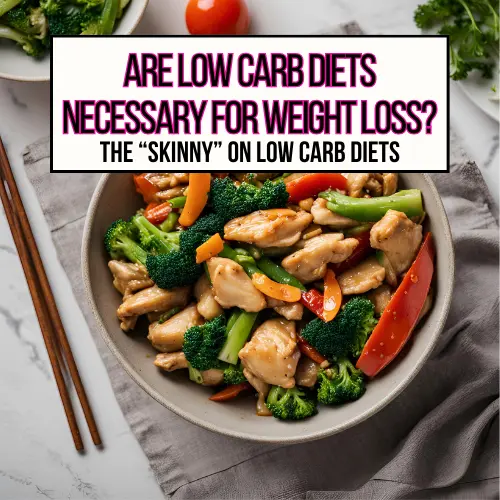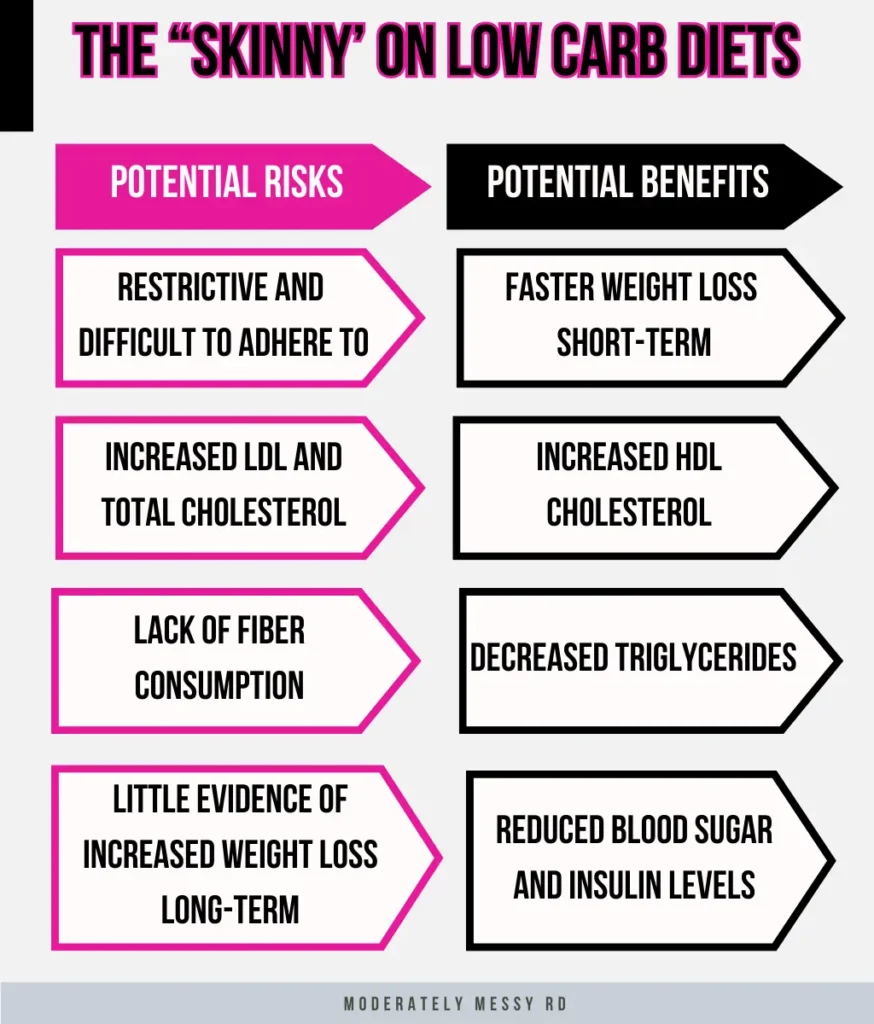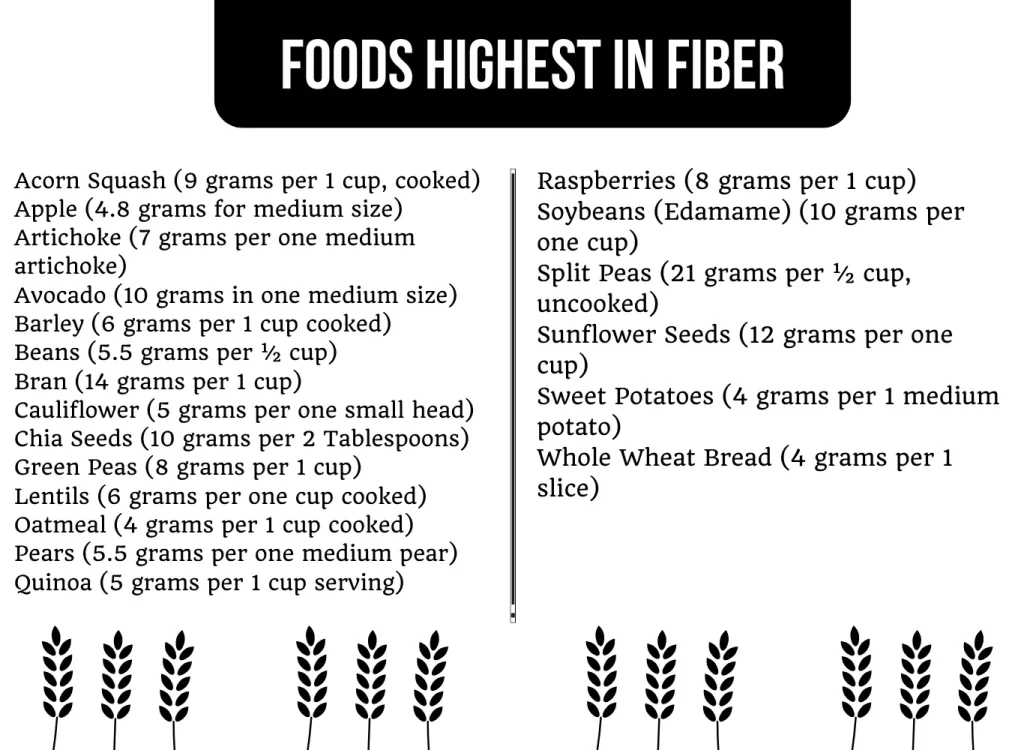A low carb diet has quickly become one of the most popular approaches to losing weight. But, are low carb diets really necessary for weight loss? This post explores what the latest research says about the relationship between low carb diets and weight loss, the potential risks, and who might benefit from this diet strategy.

It’s important to understand there is no one size fits all when it comes to weight loss. When starting a weight loss journey it’s important to think about what will work FOR YOU and not listen to what everyone else is saying worked for them. Can low carb diets lead to weight loss? Absolutely, for certain individuals. I do understand why people gravitate towards this method for weight loss and it can be beneficial in the short-term.
Is it necessary? Absolutely not. Here’s the “skinny” on low carb diets- is it right for you, or are there better options for your weight loss goals?
What Is Considered “Low Carb”?
Carbohydrates are an important fuel source for our body and brain to function properly. Both simple and complex carbs are broken down into glucose and converted to ATP, then used for energy. Any extra glucose in the bloodstream is stored in the liver and muscle tissue until needed.
Plus, non-digestible carbohydrates known as dietary fiber can have a significant impact on the composition, diversity and richness of our gut microbiome – reducing the risk of GI-related diseases and regulating metabolism.
There is no universal or standard definition of what is considered “low carb”. However, the most common description is as follows: very low-carbohydrate (<10% carbohydrates) or 20 to 50 g/d, low-carbohydrate (<26% carbohydrates) or less than 130 g/d, moderate-carbohydrate (26%-44%), and high-carbohydrate (45% or greater).
The keto diet is often classified as “very low carb”, where our body switches to a metabolic state that uses ketone bodies for energy instead of glucose.
Why Are Low Carb Diets So Popular for Weight Loss?
A low-carb diet has risen in popularity most likely due to the diet’s potential to lower insulin. Insulin is a critical hormone that produces an anabolic, fat-storing state. With lower insulin levels comes improved cardiometabolic function and induced weight loss. Many studies have shown that a low-carb diet can produce rapid weight loss in the first 6-12 months.
Another reason low carb diets are so popular is because when carbs are decreased, protein and fat are prioritized. Both macronutrients have little effect on blood sugar and promote satiety – leaving us feeling fuller for longer. This can lead to reduced hunger and overall less caloric intake.

What Does the Research Say?
Yes, there are numerous studies which show that low carb diets are effective at improving weight loss, HDL and triglycerides short-term. Short-term is the keyword here. Low carb diets may result in faster initial weight loss but experts often attribute much of the loss to water weight.
A study published in 2023 involving 100 overweight or obese individuals with type 2 diabetes found that a low carbohydrate diet was more effective than even a Mediterranean diet at promoting weight loss and improving metabolic risk factors. However, the results were concluded after a 16-week period. Therefore, we don’t know what the long-term risks and benefits are.
Therefore, we might see promising results those first 6 months of following a low carb diet, but there are very few studies that show any long-term benefits. A 2022 systematic review analyzing 61 randomized controlled trials concluded that there is little to no difference in weight reduction and cardiovascular risk after two years of follow-up.
One of the biggest proponents of weight loss is adherence, and a low carb diet, especially keto, can be difficult to adhere to. Therefore, those promising results you’re seeing the first 6 months tend to dissipate over time.
Who Would Benefit From a Low Carb Diet?
This weight loss strategy is especially helpful for certain individuals and specific circumstances. Here’s a summary of those who would benefit the most from a low carb diet:

What Are the Risks of a Low Carb Diet?
As discussed above, a low carb diet can be very difficult to adhere to – especially long-term. It might leave you feeling low energy, irritated and fatigued. When specific foods are restricted it can lead to binge eating once carbs are reintroduced – and individuals tend to regain the weight that was lost.
Even further, those following a very low carb diet or ketogenic diet might experience constipation, bad breath, insomnia, dehydration, kidney stones, hyperlipidemia, and low bone density.
Perhaps the biggest risk factor of all is the lack of fiber, which has widely been shown to reduce the risk of chronic diseases, improve the composition of our gut microbiome, and lower cholesterol. A 2020 meta-analysis of 38 studies also found that following a low carb diet can increase LDL and total cholesterol long-term and may even increase mortality risk with a carbohydrate intake of less than 40% of our daily calories.
If you are going to follow a low-carb diet, try to prioritize high fiber foods, a variety of vegetables AND stick to leaner protein to reduce the risk of increasing your cholesterol from foods high in saturated fat. I have a sample 5-Day Low Carb, High Fiber Meal Plan to help you do this!

Are There Better Options for Long-Term Weight Loss?
In my opinion, a higher protein diet with a caloric deficit can be just as effective and more realistic for long-term weight loss. Protein is the key macronutrient to making positive changes in your body composition as it is the macronutrient which takes the longest to digest and even burns the most calories while digesting.
Both protein and fiber have been shown to help slow down how quickly our food is digested and help with blood sugar stabilization. Interestingly enough, a recent study found that a high-fiber bean-rich diet was just as effective as a low-carbohydrate diet for weight loss. The bean-rich diet even significantly lowered cholesterol levels!
Therefore, if a low carb diet doesn’t seem to be helping and feels too restrictive, prioritizing protein and complex carbohydrates with fiber might be another option! Fiber helps to improve the gut microbiome, which actually influences numerous bodily processes – much more than just our digestive system.
What does this mean? Well, overall quality of the food you’re eating matters more than the amount of carbohydrates. However, more long-term studies are needed.
Best Time of Day to Eat Carbs
Is there a better time of day to eat carbohydrates? The research is conflicting – with some studies stating your body is better at burning carbohydrates in the morning and weight gain may result when consuming more calories later in the day. Some people believe we should eat a larger portion of carbs in the morning -when we are most active. Might even affect sleep quality.
However, the research is unclear – and most experts agree that total carb intake is more important that timing.
Related Posts:
— High Protein, High Fiber Meal Plan
— 20+ Recipes High in Protein and Fiber
It’s Complicated
While it is true that it can be as simple as “calories in/calories out”, I think we can all agree it is often more complicated than that.
The link between weight loss and low carb diets is still unclear – and further long-term research is needed. This approach can be effective for certain individuals, however, it does come with risks if followed for a long period of time. Knowing and understanding those risks can only help you make the best choice for YOU and your goals.
This site does not often focus on the low carb diet approach. Instead, I like to focus on carbohydrate quality – especially fiber! Feel free to follow along for resources on consuming more protein and fiber.
